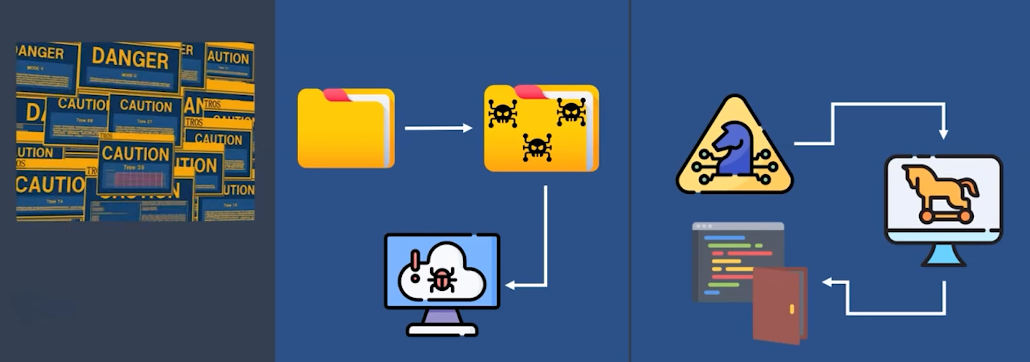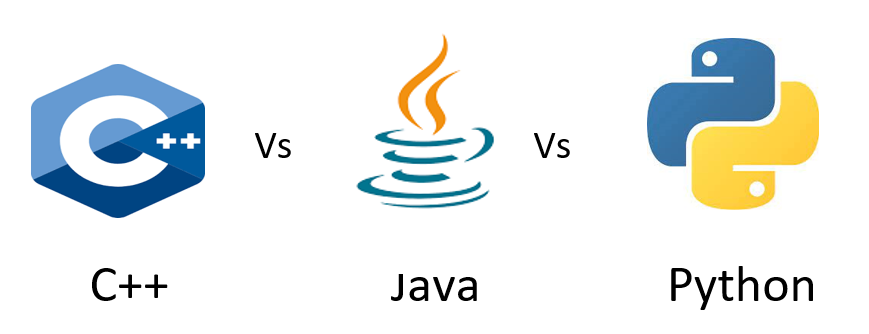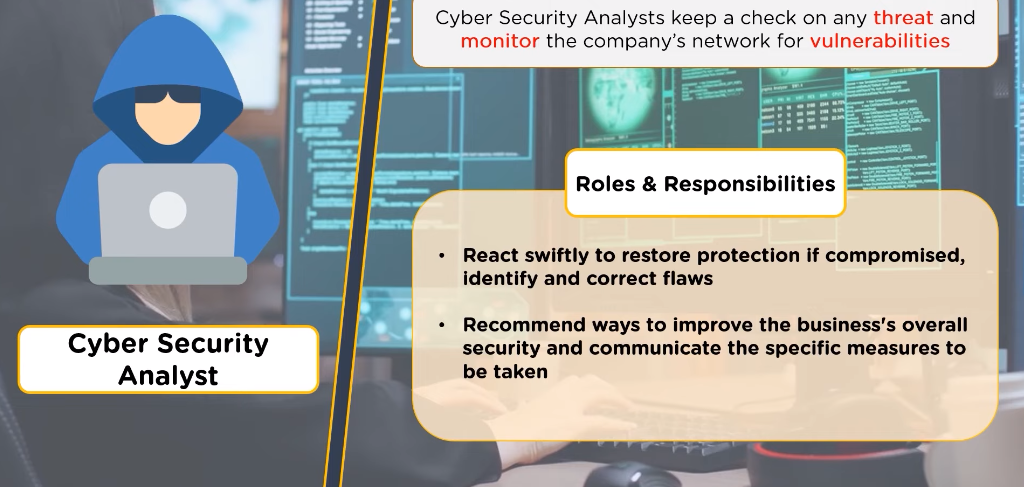Introduction
- Data security is one of the most important aspects of any organization in today’s digital world. With the increasing amount of data breaches and cyber attacks, it has become crucial for businesses to have a robust data security system in place. This is where data security analysts come into play. Data security analysts are professionals who specialize in protecting an organization’s sensitive information from unauthorized access, theft or damage.
- To become a data security analyst, you need to have a solid foundation in computer science, programming languages and database management.
- In addition to technical skills, soft skills such as critical thinking, problem-solving and communication are also essential for this role. Being able to identify potential vulnerabilities and communicate them effectively with stakeholders is critical for mitigating risks associated with data breaches. Becoming a successful data security analyst requires technical expertise and interpersonal skills.
What Is A Data Security Analyst?
Definition Of Data Security Analyst

Data security analysts are responsible for safeguarding sensitive information and data from unauthorized access or potential breaches. They analyze systems and networks to identify vulnerabilities, develop strategies to improve security and ensure compliance with industry regulations. They work closely with IT teams to implement security measures such as firewalls, encryption protocols, and malware protection.
Roles And Responsibilities Of A Data Security Analyst
Their primary role involves designing, implementing, and maintaining security protocols to safeguard the company’s data assets. They also monitor network activity to detect any suspicious behaviour and investigate any breaches that may occur.
In addition to these technical responsibilities, data security analysts are also tasked with educating employees on best practices for data protection. This includes providing training sessions on password management, phishing scams, and other common cybersecurity threats. They may also work closely with internal stakeholders such as legal teams or executives to ensure compliance with industry regulations related to data privacy.
Required Skills For A Data Security Analyst

To become a data security analyst, there are several skills that you need to possess. One of the primary skills is having a deep understanding of computer systems and networks. This includes knowledge of operating systems, databases, and programming languages such as C++, Java or Python.
Another critical skill for data security analysts is their ability to think critically and solve complex problems related to network security issues. They must be able to analyze large amounts of data, identify potential threats or vulnerabilities in the system, and develop strategies that address these issues.
In addition to technical expertise, communication skills are also essential for data security analysts. They must communicate effectively with technical and non-technical stakeholders regarding any security incidents or recommendations for improving the overall security posture.
Education And Certifications
Education Requirements For A Data Security Analyst
The education requirements for becoming a data security analyst vary depending on the employer, but most positions require at least a bachelor’s degree in computer science or a related field. Some employers may also require a master’s degree in cybersecurity or information technology.
Certifications That Are Beneficial For A Data Security Analyst
- Certified Information Systems Security Professional (CISSP): CISSP certification is one of the most popular and respected certifications for information security professionals. It covers a wide range of topics, including access control, cryptography, and network security. Obtaining this certification can help data security analysts demonstrate their expertise in a variety of areas.
- CompTIA Security+: This certification is an entry-level certification that covers basic concepts related to network security, compliance, and operational security. The exam includes questions related to risk management, threat identification and mitigation, incident response, cryptography, and more.
- Certified Ethical Hacker (CEH): A CEH-certified professional knows how to identify vulnerabilities in computer systems using the same methods as a malicious hacker. With such skills under their belt can help data security analysts safeguard from cyber-attacks by identifying potential vulnerabilities before they are exploited.
Soft Skills Required
Strong Analytical Skills
Data security analysts are responsible for identifying and mitigating potential cyber threats and vulnerabilities that could compromise an organization’s sensitive information. To be effective in this role, you must have the ability to analyze large amounts of data quickly and accurately.
Attention To Detail
The role of a data security analyst involves collecting, analyzing, and interpreting complex data sets that require intensive examination. This means that the slightest oversight can have significant consequences, especially when it comes to identifying vulnerabilities in complex computer systems.
Communication Skills
Communication skills go beyond just talking; they also involve active listening, writing, and presentation skills. You must be able to communicate complex technical issues in simple terms that non-technical people can understand. This requires explaining risks and vulnerabilities in a way that even non-experts can comprehend.
When communicating with stakeholders, it’s essential to listen actively to their concerns and questions so you can address them effectively. It would help if you also were prepared to present your findings in a clear and concise manner using charts or graphs where necessary. Data security analysts must be adept at creating reports that summarize their findings for upper management.
Problem-Solving Skills
You will need to identify potential threats and vulnerabilities in the system, analyze complex information, and develop strategies to protect the organization’s data. One of the most important skills you must possess is critical thinking. By analyzing problems from different perspectives and considering all possible solutions, you can effectively solve complicated data security issues.
Experience And Internships
How To Gain Experience In The Field
Start with an entry-level position. It will give you a foundation in the basics and help you understand how everything fits together. These positions typically involve monitoring systems, assisting senior analysts and handling day-to-day operations.
Another option is to seek out internships or apprenticeships that allow you to work alongside experienced professionals. This can give you hands-on experience with real-world scenarios and provide valuable networking opportunities. Many companies offer these programs specifically for those who are interested in entering the field but lack formal training or education.
The Importance Of Internships And How To Find Them
Internships offer valuable experience and opportunities to learn from experienced professionals in the field. They also provide networking possibilities that can be useful when looking for full-time employment.
To find internships, start by checking with your school’s career centre or job board. Many schools have partnerships with companies that offer internships to students. You can also search online job boards such as Indeed, Glassdoor, and LinkedIn for available internships in your area.
In addition, it’s worth reaching out to companies directly to inquire about any potential internship opportunities they may have available. This shows initiative and interest in the company, which can help set you apart from other applicants. When applying for internships, make sure to tailor your resume and cover letter specifically for each position you apply for.
Transferable Skills That Can Be Gained From Other Positions
If you’ve worked as an IT support specialist before, your troubleshooting and problem-solving skills will come in handy when working with various cybersecurity issues. Similarly, if you’ve been a software engineer or developer, your knowledge of programming languages and code review practices can be valuable when assessing system vulnerabilities.
Moreover, having experience in project management or business analysis roles can also help hone your communication and organizational skills – qualities that are crucial for successful data security analysts.
Job Opportunities And Salaries
Types Of Industries That Hire Data Security Analysts
Industries that deal with sensitive data such as healthcare, finance, and government agencies often have strict regulations regarding data protection. These industries hire data security analysts to ensure compliance with these regulations and safeguard against any breaches that may occur. The financial sector requires robust cybersecurity measures due to the abundance of personal and financial information they handle daily.
The technology industry also seeks the expertise of data security analysts as they develop software applications or build networks susceptible to hacking attempts. E-commerce companies must secure their customers’ payment details which require encryption systems implemented by data security experts. As cybercrime continues to rise globally, businesses across all industries will need professionals specialized in protecting valuable company assets from malicious attacks – making this career path more relevant than ever before.
Job Titles And Descriptions

Job titles related to data security and information technology include cybersecurity specialist, cybersecurity analyst, information security analyst, network security engineer, and IT security consultant. These professionals work together to ensure the safety of an organization’s digital infrastructure by implementing preventative measures such as firewalls, encryption protocols, access controls, antivirus software and intrusion detection systems.
A typical job description for a data security analyst would include requirements such as experience with vulnerability assessments, knowledge of various programming languages like Java or Python, and proficiency in network protocol analysis tools like Wireshark or Tcpdump. Additionally -experience with system hardening techniques (e.g., disabling unnecessary services) is valued in the field. A bachelor’s degree in computer science or a related field is usually required for this role along with certifications such as CompTIA Security+, Certified Information Systems Security Professional (CISSP), Certified Ethical Hacker (CEH), GIAC Penetration Tester (GPEN), among others.
Average Salaries For Data Security Analysts
According to Payscale, the average salary for data security analysts in the United States is $113,270 per year. However, this figure can vary depending on several factors such as location, experience level, industry and company size. For example, data security analysts working in tech hubs like San Francisco or New York City can expect to earn significantly more than those working in rural areas. Similarly, those with advanced degrees or professional certifications may command higher salaries than entry-level candidates.
Industry Trends And Future Outlook
Current And Future Trends In Data Security
One current trend in data security is the use of machine learning algorithms to detect and prevent cyber attacks. By analyzing large amounts of data, these algorithms can identify patterns and anomalies that may indicate a breach or threat. Another trend is the increased focus on user behavior analytics (UBA), which involves monitoring how employees interact with company systems and identifying any unusual or suspicious activity.
Looking ahead, there will likely be continued developments in biometric authentication methods as well as an increased emphasis on cloud security. As more companies move their operations to the cloud, ensuring that their data remains secure will become even more critical.
The Impact Of Emerging Technologies On Data Security
Emerging technologies such as artificial intelligence (AI), blockchain, and Internet of Things (IoT) have brought significant advancements in data collection, sharing, and analysis. However, these technologies have also introduced new security challenges that data security analysts must address. For example, AI-powered systems require the collection of large volumes of data that could be compromised if not secured properly. Similarly, IoT devices often lack robust security features and can act as entry points for hackers into larger networks.
As a result, data security analysts must stay up-to-date with emerging threats and technologies to effectively protect their organizations from potential breaches. This requires a deep understanding of various cybersecurity tools and protocols available to secure digital assets against unauthorized access or theft.
Potential Job Growth In The Field
As technology continues to evolve and become more sophisticated, so do the threats that companies face. Therefore, there will always be a need for data security analysts who can stay ahead of these threats and protect valuable information from being compromised. In addition to a growing demand for professionals in this industry, there is also potential for career growth within this field. Data security analysts have opportunities to move into higher-level positions such as cybersecurity managers or chief information officers.
Job Search Strategies
How To Search For Data Security Analyst Jobs?
To search for data security analyst jobs, start by conducting a comprehensive job search on popular online job boards. Use relevant keywords such as “data security,” “information security,” and “cybersecurity” to narrow down your search results. Filter your search results based on location, industry, and level of experience.
Join cybersecurity groups on LinkedIn or attend local events hosted by organizations such as ISACA or (ISC)². These events provide an opportunity to meet with recruiters and other professionals in the field who can offer valuable insights on current job openings.
Consider reaching out to staffing agencies that specialize in information technology and cybersecurity positions. This can be an effective way to get matched with opportunities that align with your skills and interests while also receiving guidance from experienced recruiters who know what employers are looking for in a data security analyst candidate.
Tips For Writing An Effective Resume And Cover Letter
Begin with a clear and concise summary of your qualifications in the top third of your resume. This section should highlight your relevant education, certifications or experience in data security.
Additionally, tailor both the resume and cover letter to the specific job description you are applying for. Use keywords from the job posting throughout these documents so they stand out to potential employers who may be scanning through numerous applications.
Make sure both documents are error-free by proofreading them multiple times or asking someone else to review them. A small typo can cost you an opportunity for an interview as data security is a field where attention to detail is crucial.
Interview Tips And Techniques
- Research the Company: Before heading to your interview, research the company thoroughly. Go through their website, social media pages, news articles and try to understand their business operations. This will help you form a better understanding of what they are looking for in an employee and how you can best fit into their team.
- Practice Common Interview Questions: Data security analyst roles require technical skills as well as good communication skills. Practice answering common interview questions that showcase your expertise in data security while also demonstrating your professionalism and ability to work collaboratively with others.
- Demonstrate Your Skills: During the interview, be sure to highlight specific examples of projects or assignments where you have demonstrated success in data security analysis. Be prepared to discuss any challenges you faced during those projects and how you overcame them. Showcase any relevant certifications or training courses that demonstrate your knowledge of industry standards and best practices.
FAQs
What Programming Languages Do Data Security Analysts Need To Know?
Some of the most commonly used programming languages in this field include Python, Java, C++, and Ruby.
Python is often used for data analysis tasks since it has powerful libraries for numerical computing and machine learning. It also has an easy-to-learn syntax, making it accessible to beginners. Java is another popular language, particularly for developing secure web applications. Meanwhile, C++ offers high performance and low-level control over system resources that are important in building security-focused software systems. Ruby’s versatility makes it useful for writing scripts or small-scale programs.
How Much Experience Do I Need To Become A Data Security Analyst?
While there is no set amount of experience required to become a data security analyst, many employers prefer candidates with at least three years of experience in an IT-related field. This experience can be gained through internships, entry-level positions, or even freelance work.
What Is The Difference Between A Data Security Analyst And A Cybersecurity Analyst?
A data security analyst’s primary focus is on protecting an organization’s sensitive information and ensuring its confidentiality, integrity, and availability. They implement policies and procedures to safeguard information against unauthorized access, loss or theft while ensuring compliance with relevant laws and regulations.
On the other hand, a cybersecurity analyst primarily focuses on identifying vulnerabilities in an organization’s computer systems and networks that could be exploited by cybercriminals. They design and implement strategies to prevent cyber attacks such as malware, phishing scams or ransomware from taking place. Cybersecurity analysts also create incident response plans in case of a breach to minimize damage.
How Can I Achieve Work-Life Balance In A Demanding Data Security Role?
To establish boundaries between work and personal life, set specific working hours and strictly adhere to them. This will help you avoid overworking yourself and ensure that you have sufficient time for family, friends, hobbies, or other activities. Prioritize tasks effectively by dividing them into urgent and non-urgent categories based on their importance. This will help you focus on tasks that are critical first while allowing room for less important ones later in the day or week. Additionally, delegating responsibilities where necessary can lighten your workload and reduce stress levels.
Conclusion
Becoming a data security analyst requires a combination of education and experience. A bachelor’s degree in computer science or a related field is often the minimum requirement for entry-level positions, but advanced degrees such as a master’s in cybersecurity can lead to higher-paying roles. Additionally, obtaining certifications such as the Certified Information Systems Security Professional (CISSP) can demonstrate expertise and competence in the field.
It is also important to gain practical experience through internships or entry-level positions in data security. This will allow individuals to develop technical skills and learn about current industry trends and best practices. Continuing education and staying up-to-date with emerging technologies are also crucial for success in this rapidly evolving field.
